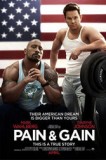| Reviews & Columns |
|
Reviews DVD TV on DVD Blu-ray 4K UHD International DVDs In Theaters Reviews by Studio Video Games Features Collector Series DVDs Easter Egg Database Interviews DVD Talk Radio Feature Articles Columns Anime Talk DVD Savant Horror DVDs The M.O.D. Squad Art House HD Talk Silent DVD
|
DVD Talk Forum |
|
|
| Resources |
|
DVD Price Search Customer Service #'s RCE Info Links |
|
Columns
|
|
|
Pain & Gain
The crimes of Daniel Lugo, Adrian Doorbal, and John Carl Mese are genuinely horrifying, the kind of material that one expects to see discussed discreetly in a TV documentary, and to an extent, it's a little disturbing that Hollywood greenlit an early-summer Michael Bay comedy based on their story. Yet, Pain & Gain is an intriguingly self-aware, committed to portraying the trio (played by Mark Wahlberg, Anthony Mackie, and Dwayne Johnson) as morons so drunk with steroids and the American dream that they couldn't even comprehend the scope of their actions.
The most intriguing factor in this equation is Bay, who pushed to make the movie for several years, and trimmed his budget down to $25m (the lowest he's had since he made his directing debut on the first Bad Boys). It's valid to worry about Bay lionizing three murderers, but Bay's over-the-top style is actually the joke. The Daniel Lugo of this movie thinks of Pacino's Scarface as an American hero, and although Bay sounds like the kind of director that Lugo would have demanded tell his story on screen, all of Bay's usual excess is dedicated to making these guys seem cruel, greedy, and stupid. The film is bookended by perfect examples of the film's tone: Lugo's less-than-badass introduction, bouncing off the hood of a cop car into the windshield in slow motion, and one of Bay's trademark low-angle hero shots, capturing Lugo at his most deluded, staring up at barbed wire fences and decked out in prison orange as he suggests in voice-over that life still has big plans for him. Bay is the punchline to the movie's joke, in a way that slyly kids his own directorial trademarks and deflates the oversized image of these guys as dreamers. During one of the film's more grotesque moments, Bay even slips in a caption to remind the viewer that "this is still a true story," down to the last grimy detail.
To support Bay's tone, the actors walk a fine line, using sincerity in a way that both remains true to the movie's vision of the characters but plays as funny without winking to the audience. Wahlberg grabs some big moments by amping up his performance to ridiculous heights in the second half, and Mackie's glorious cluelessness is scores some of the film's biggest laughs, but Johnson walks the trickiest path, between the character's newfound faith, his drug addiction, and his ability to reconcile one with the other. In some ways, his version of Mesa is the most despicable of the three, because his delusions and selfishness have to pass through his belief that he's doing the Lord's work first. Or perhaps it's because he's the most likable and "innocent" when Lugo and Doorbal enlist him in their plan, and when he caves, it's kind of disappointing. Shalhoub also scores big comedy points as "Victor Kershaw," (the millionaire was re-named for the movie), one of the most repulsive, reprehensible victims ever (even after the guys back a truck over his face, it's hard to feel sorry for him), and Rebel Wilson provides a measure of relief from everyone else as one of the only sympathetic characters.
Although it will always be a little uncomfortable to see a major motion picture company making glossy entertainment out of real-life tragedy, Pain & Gain works that contradiction into the movie. The glib flashiness of the picture is like a realization of events through the eyes of the fictionalized Lugo, who espouses the "pain and gain" mentality without understanding what it means. As he looks out across Kershaw's patio at the ocean, drinking in the house and the money and his new life, you can hear him thinking, "and all it took was good old fashioned hard work."
Please check out my other DVDTalk DVD, Blu-ray and theatrical reviews and/or follow me on Twitter.
|
| Popular Reviews |
| Sponsored Links |
|
|
| Sponsored Links |
|
|
| Release List | Reviews | Shop | Newsletter | Forum | DVD Giveaways | Blu-Ray | Advertise |
|
Copyright 2024 DVDTalk.com All Rights Reserved. Legal Info, Privacy Policy, Terms of Use,
Manage Preferences,
Your Privacy Choices | |||||||











